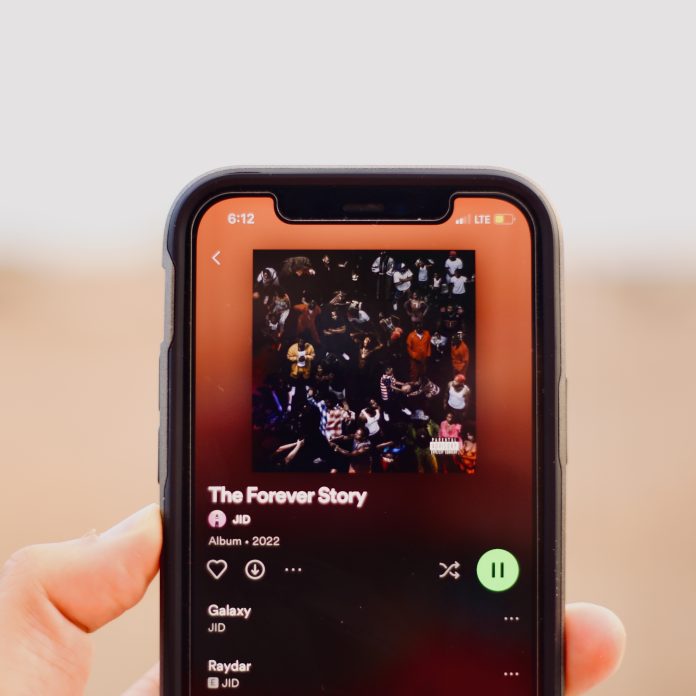Andy Knox
Arts & Entertainment Editor
The origin of the ambiguously pronounced “JID” is a mystery to those who do not know how to use Google. Experienced users can find that his rap name came from the childhood nickname he got from his grandmother, “jittery.” Her unique accent made it sound like the letters “J-I-D.” By all means, JID sticks to these jittery roots in his fantastic new album, The Forever Story.
His syllable-bouncing ability is apparent not only in his dynamic flows, but also in how he carries his voice. When he pronounces each word in the straight 16th note-based chorus of “Surround Sound,” his tone and delivery make it feel like he could snap into a new pattern at any point, but chooses to maintain straightforward and controlled for a reason.
After four bars all rhyming with the groovy opening, “Push the fuckin’ pack off of the porch and break a pound down,” his break into quicker and slower triplets makes for a release of tension akin to a clogged pipe with a slow leak bursting open.
The relentless switches of not only the syllable pattern, but also the beat on which the line ends, make the track head-spinner after head-spinner. JID’s tendency to extend a line just a bit longer than expected can make a verse feel like a roller coaster ride. It’s fun to swerve back and forth, and JID’s constant feeling of effortlessness makes you feel like you’re in the hands of an experienced, competent conductor.
It is a given that any rapper signed to J Cole’s record label Dreamville will be skilled but, unlike Cole, JID songs all have interesting topics. The story he tells about his family getting into a brawl at a party in “Crack Sandwich” is so thrilling and well-written, it wouldn’t even have to be a song to be good. The lyrical progression from introducing context and general images to diving into the gritty details of the fight is complemented by the increasingly hushed, intense beats and real audio clips of his siblings enthusiastically reminiscing about the event. The structure is amazingly compelling for how unusual it is, raising the question, “Why aren’t more people writing songs like this?”
These unique structures are one of the album’s most standout features. Along with his army of producers, JID splits many of the tracks into two distinct parts marked by a beat switch and tone change, usually to address the song’s topic from a different angle and also just to spice things up.
These beat switches are executed with great effect in “Bruddanem,” which opens with a jittery and jazzy minimalist beat as JID whimsically raps about how he and his brothers have each other’s backs. When the more mainstream, autotune-reliant Lil Durk feature comes in, the bass is boosted and ever-so-slightly distorted — one of a myriad of subtle perfections in the production that makes The Forever Story such an easy listening experience. One split second of silence after Durk’s verse, the upbeat song turns down to white noise and piano as a man solemnly reads a sweet poem about remembering his dead brothers and caring for them after they’re gone. It makes the rest of the song hit harder in retrospect.
The near-opening line in “Raydar,” “I got the shit you could play for yo momma / I got the shit you could play for the hoes” is actually an understatement of JID’s versatility, which he flexes left and right throughout the project. The anthemic “Money,” featuring a horn section and a children’s chorus, is something anyone’s momma could get down to, and the swaggy sample and 808s in “Dance Now” make it a twerkable masterpiece. On the other hand, the aggressive and bouncy “Can’t Punk Me,” featuring EARTHGANG of JID’s same label, is perfect for speeding down the highway in the car whether alone or with friends. Meanwhile, the lower-key, heartfelt narrative songs “Better Days” and “Sistanem” are great for some late night rumination. The chorus’ chants of “swing on, swing on” in “Kody Blu 31” are both fun and inspiring. The violins and single-person howls in the background add just a drop of drama to a less-than-serious but genuine call to action.
Although not every track is as memorable as “Crack Sandwich” or “Can’t Punk Me,” especially in the latter half of the album, The Forever Story remains an incredibly consistent album. The listening experience is immaculate in all respects but its foul language. Instead of evil, JID is a team player who uses his powers as an extremely technically skilled rapper for the good of the track, optimizing every aspect. The drastic beat switches that tend to turn on a dime are a bit experimental but don’t make it any harder of a listening experience — just pleasantly jittery.
Rating: 8/10











